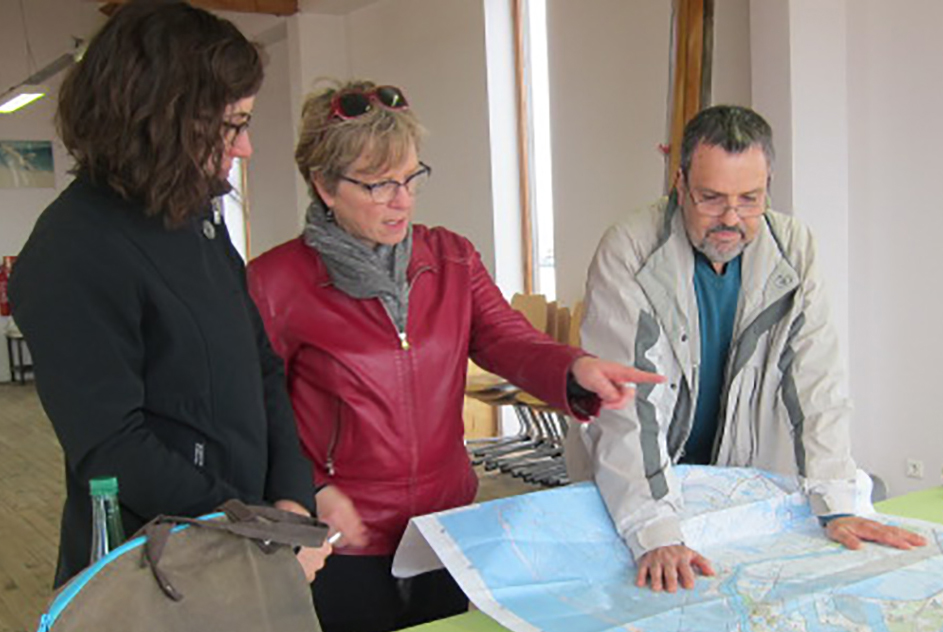Enlisting French Residents for Study Validating Pollution-Driven Health Claims
April 25, 2017

For many years, state-funded health studies have disproved claims by residents and local doctors in one of France’s largest industrial regions that people living in this area had elevated levels of many illnesses.
However, a recent study led by Barbara Allen, professor of science and technology studies at Virginia Tech in the National Capital Region, has confirmed their complaints.
The study has gained attention of the French press, having already garnered 70 news articles, radio interviews, and television segments even before the French AFP — the equivalent of the U.S. Associated Press — released a story for its outlets.
The region in question is home to almost 430 installations, including chemical plants, oil refineries, natural gas facilities, and steel production.
Allen became aware of this problem in 2014 while working in France on a National Science Foundation–funded project looking at how citizens shaped policy-relevant environmental science in different national contexts.
“What struck me was that while U.S. residents living in polluted communities often struggle to have even one health study done, in France, it is not unusual to have multiple studies conducted,” Allen said. “Yet, the results are always the same. Residents’ own suspicions about illnesses are not only never confirmed, but even worse, dismissed because of these health studies.”
Allen thought that the best way to get answers would be to design a study from the residents’ perspective by enlisting their participation. She received funding from the French Agency for Food, Environmental and Occupational Health to conduct a community-based participatory environmental health study in two polluted towns: Fos-sur-Mer and Port-Saint-Louis-du-Rhône.
The agency, established 10 years ago, aspires to a model of collective and collaborative expert assessment and sets itself apart from the establishment French health and environmental agencies by being more open and accessible to the public.
In 2015, Allen and two doctoral students — Alison Cohen, an epidemiology major at the University of California Berkeley, and Yolaine Ferrier, an anthropology major at the Centre Norbert Elias in Marseille — held interviews and group meetings with residents and local doctors to find out, firsthand, questions they had about their health.
Based on input from these two groups, the team developed a questionnaire they took door-to-door until they had surveyed more than 800 households, representing over 10 percent of the population.
Following are some of the study’s findings:
- Compared to the larger French population, adult asthma was 50 percent higher; cancer was two to three times the national average.
- Compared to the national population, type 1 diabetes (an environmentally triggered autoimmune disease) was three to four times higher and endocrine diseases appeared significantly elevated.
- There was an elevated prevalence of chronic problems, such as skin problems, eye irritation, nose and throat problems, frequent headaches, and nosebleeds.
- A majority of residents (63 percent) reported at least one chronic problem that affected their daily lives.
Allen and her team completed a 72-page report in collaboration with the residents and local doctors by holding more than a dozen focus groups to analyze the data and better understand the health data in the context of the two towns.
Resident volunteers not only helped finalize the report, but also made valuable contributions, including more than 40 recommendations for “next steps” to push for environmental improvements, Allen said.
“Several French TV journalists told us how surprised they were that all the residents they questioned knew about the study’s results and could talk about it,” said Allen.
Allen said one of the towns has already used the study results to challenge re-permitting of a nearby facility and to justify new health research that doctors are proposing at a local hospital.
“Our participatory methodology has been of particular interest to many other polluted French towns,” Allen said. “Eight of them have already approached us about wanting a similar survey in their own town.
“I believe that if we allow people to help shape and make science we can democratize science and create a kind of knowledge justice,” said Allen. “In this particular case, I think we’ve shown that health from the perspective of the people for whom the science matters can have positive impacts.”







